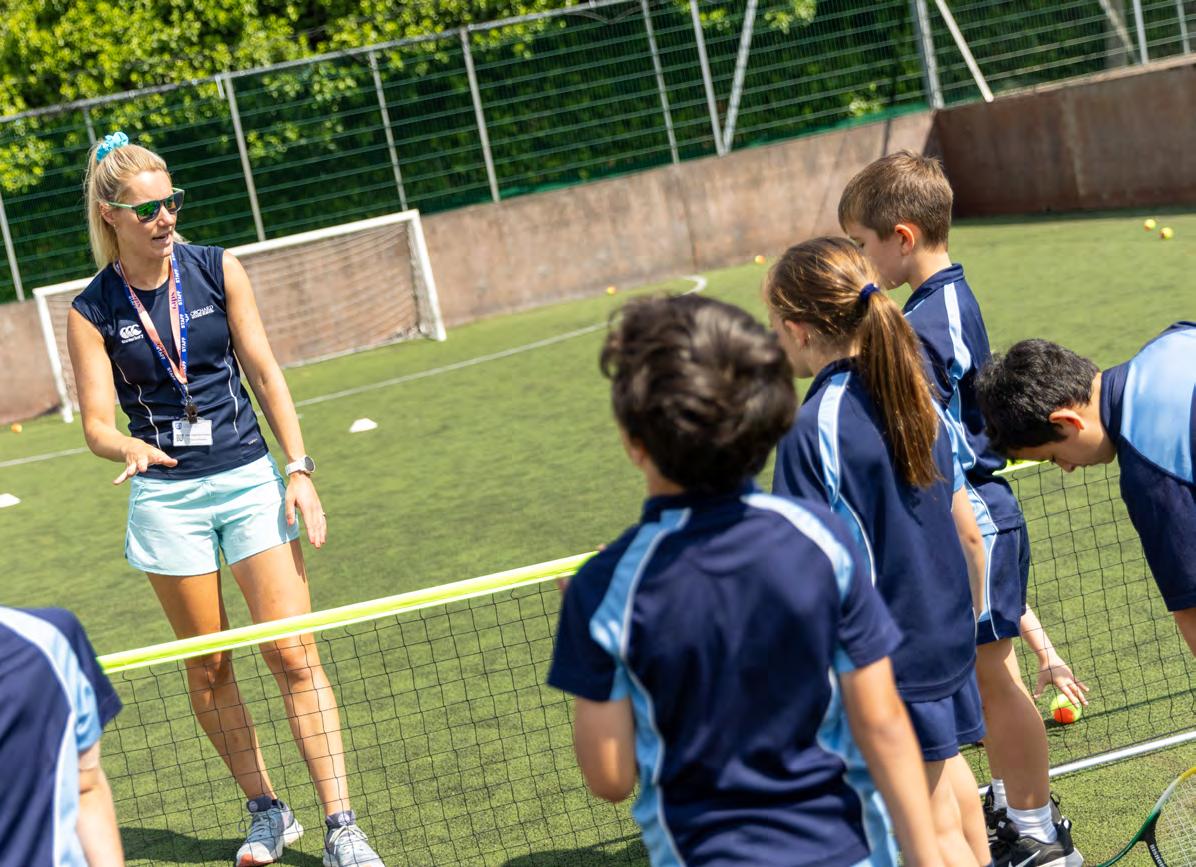















Growing the brightest minds.





















Growing the brightest minds.





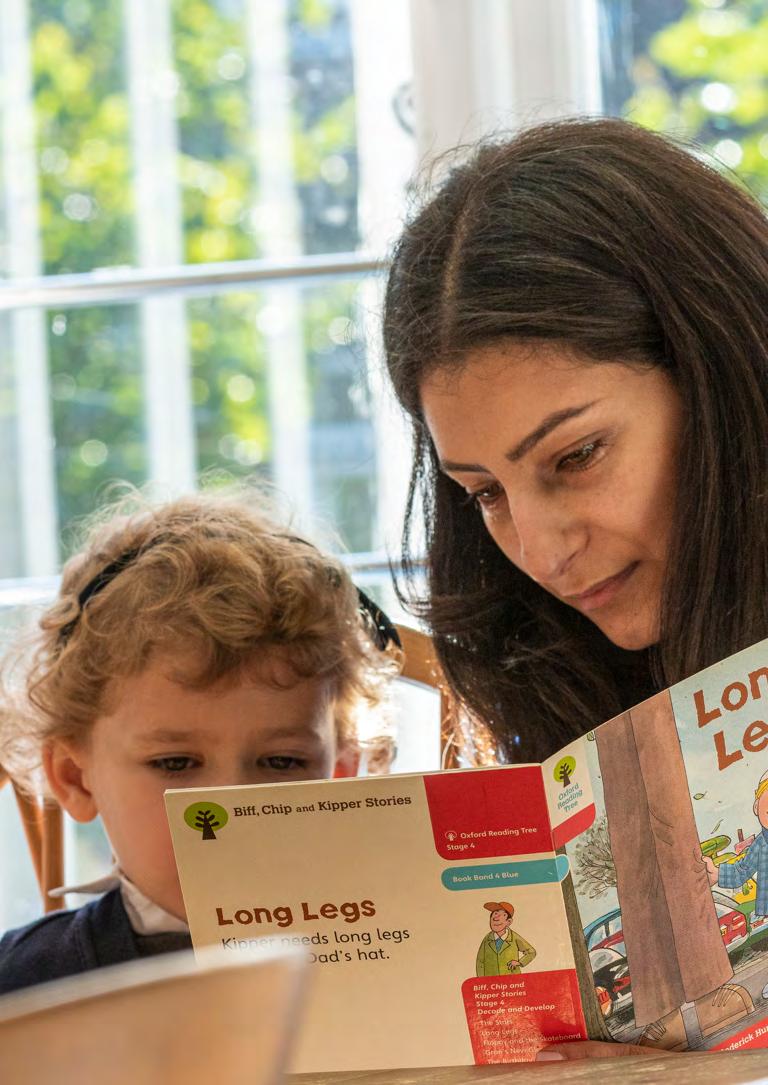

At Orchard House School, we believe that every child deserves an education that not only prepares them for exams, but equips them with the skills, knowledge, and character to thrive in a rapidly changing world. Our bespoke curriculum, The Learning Orchard, is designed with this vision at its heart.
Rooted in the four guiding principles of Holistic Learning, Leadership, Powerful Knowledge, and World Readiness, The Learning Orchard nurtures inquisitive minds and fosters a lifelong love of learning. We aim to inspire every child to be their best, to think critically, and to embrace the challenges and opportunities that lie ahead.
Our dedicated team of educators is committed to delivering exceptional teaching across a broad and interconnected curriculum. From the sciences to the arts, from philosophy to mathematics, every subject is carefully designed to spark curiosity, creativity, and confidence in our students. We complement this academic excellence with a rich array of extracurricular activities, ensuring that each child receives a well-rounded and fulfilling education.
At Orchard House School, we cultivate not only knowledge, but the qualities that will help our students succeed as compassionate, articulate, and adaptable individuals. We are proud of the environment we have created—a place where children can grow, learn, and become leaders of tomorrow.
Thank you for considering Orchard House School for your child’s education. We look forward to welcoming you and your family to our community.
Warm regards,
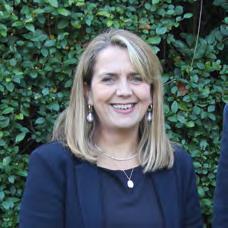
Mrs Henrietta Adams Head, Orchard House School








We designed our curriculum to prepare every child for their future.
With truly exceptional teaching of the core 11+ subjects, our bespoke curriculum sets children on a path to some of the best day and boarding schools in the UK.
In The Learning Orchard, we have built an approach to education that prepares the next generation not only for exams, but for all that comes next. An approach that helps them adapt to any terrain. Fostering a lifelong love of learning and an inquisitive mind, it is a curriculum rooted in four guiding principles: Holistic Learning, Leadership, Powerful Knowledge and World Readiness. It is rich with knowledge and underpinned with philosophy and oracy; teaching is exemplary; and every aspect sparks curiosity and creativity. It is progressively knowledgeable, supportively stretching, and reassuringly rigorous.
Our established teaching and extracurricular activities across sport, music and languages complement this bespoke curriculum to comprise a superlative education. Altogether, it is the best possible preparation for an extraordinary life. Your child deserves nothing less.
As a school we take a character-first approach that values kindness, openness, attentiveness and excellence. Therefore, we designed The Learning Orchard to nurture valuable qualities that make for modest yet ambitious young people who have all they need to excel.
Our valuable qualities are…
Each subject, lesson and activity of The Learning Orchard curriculum is rooted in four guiding principles.




We intrinsically and explicitly link topics, knowledge and skills across the curriculum. Lessons are contextualised and applied; creative and fun, inspiring a lifelong love of learning in every child.
The preservation and protection of our world depends on strong leadership. We nurture a sense of community, champion a dedication to service and celebrate initiative to inspire future leaders.
Through a broad, knowledge-rich curriculum that encourages curiosity and exploration, we provide our children with the skills and understanding they need to become wellrounded and informed individuals.
The next generation must be equipped for a changing world. By fostering creativity, invention, adaptability and an appetite for discovery, we help our children to thrive both at school and beyond.

pg10
High quality children’s literature is at the heart of our approach to English. We select diverse and challenging texts including novels, short fiction, biography, non-chronological reports and poetry, which we use as the basis for teaching. To further develop vocabulary and comprehension, we link texts with topics throughout the curriculum.
pg12
Preparation for 11+ examinations drives our maths teaching from the earliest days at Orchard House School. We strive for understanding and mastery, fostering a deep and conceptual comprehension of each strand and providing children with regular opportunities to apply their skills.
pg14
Our Science teaching is rich both in knowledge and hands-on experimentation. It simultaneously feeds and cultivates curiosity, encouraging children to ask questions, use their initiative and make discoveries. To ignite interest in sustainability and root learning in the world around us, we link relevant topics with environmental issues.
pg16
History and Geography may be overlooked by some, but not Orchard House School. We take a valued, specified and holistic approach to teaching Knowledge, exposing children to ambitious content supported throughout the wider curriculum. By doing so, we develop vocabulary; enhance critical thinking; and inspire lifelong curiosity.
pg18
This bespoke project-based programme applies art and design principles to traditional STEM subjects. Through a range of challenging projects, children explore multiple concepts, ideas and solutions to real-world problems. Each project is interlinked with the wider curriculum to apply and reinforce learning.
pg20
Verbal and non-verbal reasoning skills are crucial to 11+ examinations. Our dedicated teaching for KS2 explores patterns, sequences, logic and manipulation of words, numbers and shape. It hones critical thinking abilities; encourages children to adopt different perspectives; and supports their wider academic career.
pg22
Comprising visual art, drama and music, The Arts are highly valued at Orchard House School. Topics promote creativity and self-expression alongside ambitious teaching of artistic periods, mediums and movements. Learning is interconnected with the Knowledge curriculum, adding colour and texture to people, places and moments in time.
pg24
Our school fosters a talk-rich and curious culture. By actively weaving Philosophy and Oracy throughout the curriculum, we help children to delve deeper into key concepts; experiment with new vocabulary; ask thoughtful questions; and articulate themselves correctly in both speech and writing.
To support children to read and write with accuracy, we place high quality, challenging children’s literature at the heart of our approach to English.
Texts of every form and genre, including novels, poetry, short stories, newspapers, reports and biography, form the basis of our teaching. Through the study of these texts we develop excellent reading comprehension, vocabulary, and writing abilities; explore different cultures and perspectives to foster empathy and social awareness; and inspire a lifelong love of literature. By selecting texts that underscore the wider curriculum, we also reinforce learning and vocabulary beyond the English classroom.
English is, at its heart, a subject that promotes both self-expression and creativity. Supplemented with sponsored read-a-thons, author visits, elaborate World Book Day celebrations and poetry competitions, our teaching ignites a passion for words, their great power and their immense possibilities.
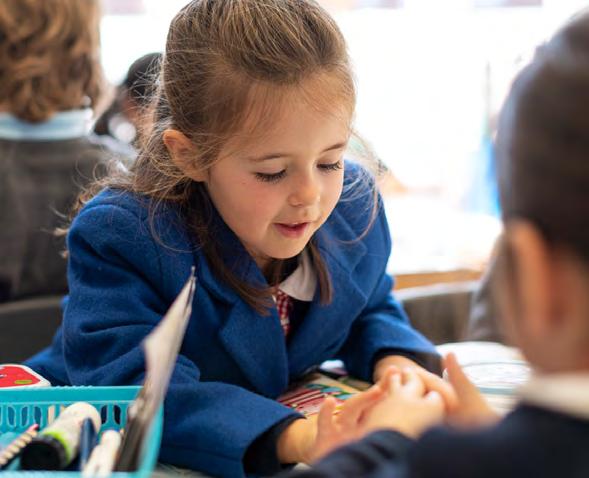

In Form 3, The Green Ship by Quentin Blake and The Great Kapok Tree: A Tale of The Amazon Rainforests support learning about settlements, maps and voyages.
Form 5 children studying The Victorian Age are taught Street Child by Berlie Doherty and Oliver Twist by Charles Dickens, the latter of which is also used to delve deeper into narrative structure.
Though the chosen texts are less complex, the same integrated approach applies to Form 1. They write non-chronological reports about their pets; learn about animals and their needs; and read the supporting text Rabbit and Bear: Rabbit’s Bad Habits by Julian Gough and Jim Field.
• Teachers employ methods including drama, art and discussion to help children connect emotionally and intellectually with each text.
• Texts are linked with topics in subjects such as Science, Knowledge and STEAM to strengthen wider learning and vocabulary.
• Alongside our literature-centred approach, we teach the Read Write Inc programme from Reception to Form 6 to support reading fluency, comprehension and spelling.

• We evaluate children’s progress continuously with regular written and verbal feedback, peer and selfassessment, and termly and annual assessments.



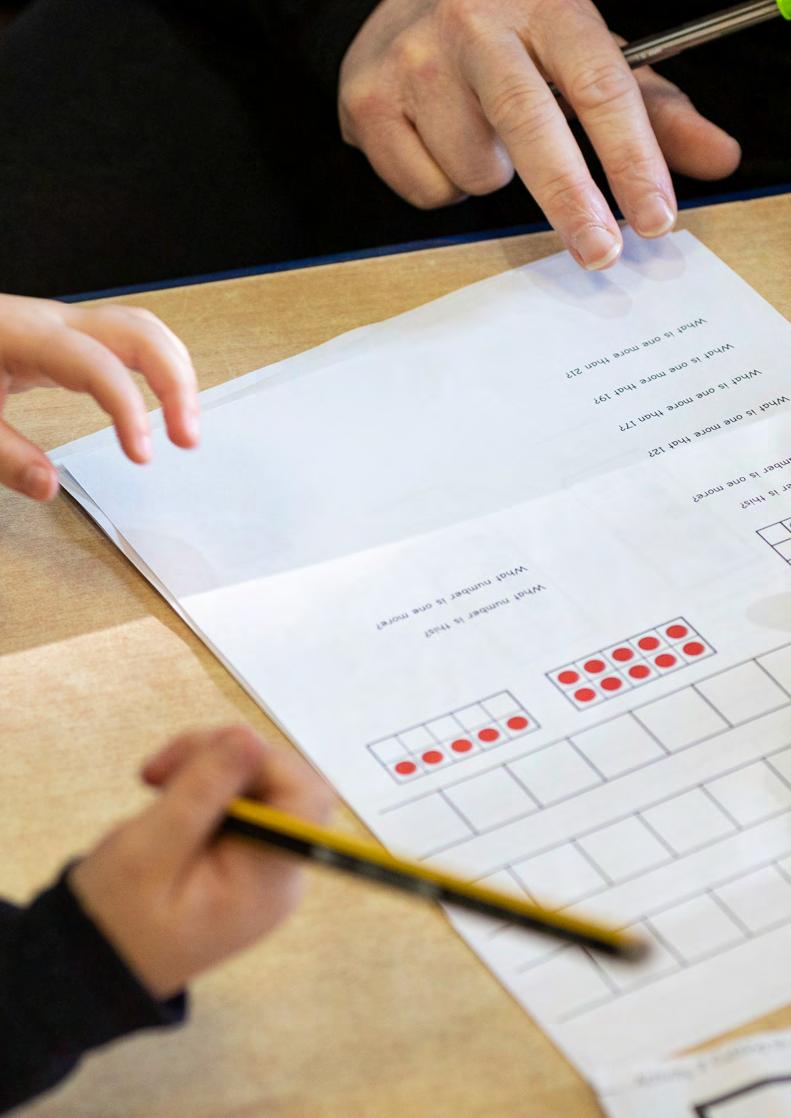

Mathematics is not just about numbers; it encompasses vital problem-solving, reasoning, investigation and critical thinking skills. Our Maths curriculum, therefore, is deliberately demanding and rigorous, preparing children for both the 11+ examinations and their future learning.
We teach for understanding and mastery, making complex mathematical concepts tangible and providing a variety of opportunities for children to apply their knowledge. We are also an NRICH Problem-Solving School. NRICH is a mathematics enrichment project from the University of Cambridge, and our collaboration nurtures positive attitudes to problem solving, builds resilience and develops communication skills.
By the end of Form 6, we will have provided children with everything they need to master fundamental concepts including arithmetic, geometry, statistics, measurement and basic algebra. All of which will be crucial not just to their academic success, but to their everyday lives.
There are continuous strands to our teaching of maths, which run throughout Forms 1 to 6: Place Value, Measures and Data, Calculation, Fractions and Geometry. We introduce Algebra in Upper Key Stage 2 (UKS2).
We add new layers of complexity to each strand as children learn and grow. For example, the Fraction strand begins simply in Form 1 with the teaching of halves and quarters. By Form 5, this progresses into calculations using fractions and decimals; introductions to percentages, ratios and proportion; and the tackling of unit and non-unit fraction problems. Measures and Data, similarly, starts with understanding money and time and evolves into the study of volumes, metric and imperial units, graphs, pie charts and data sets.
• To teach for understanding, we use hands-on manipulatives that make Mathematics more tangible and accessible. These can include counters, blocks, bead bars and Numicon, all of which are particularly beneficial for visual and kinesthetic learners.




Pure mathematics is, in its way, the poetry of logical ideas.
- Albert Einstein

• To teach for mastery, we design opportunities for children to regularly explore, investigate and practise applications in multiple ways and contexts.



• We reinforce learning and monitor progress with frequent, short, lowstakes quizzes.
• Through formative termly and annual summative assessments, we track individual progress and inform teachers’ planning.
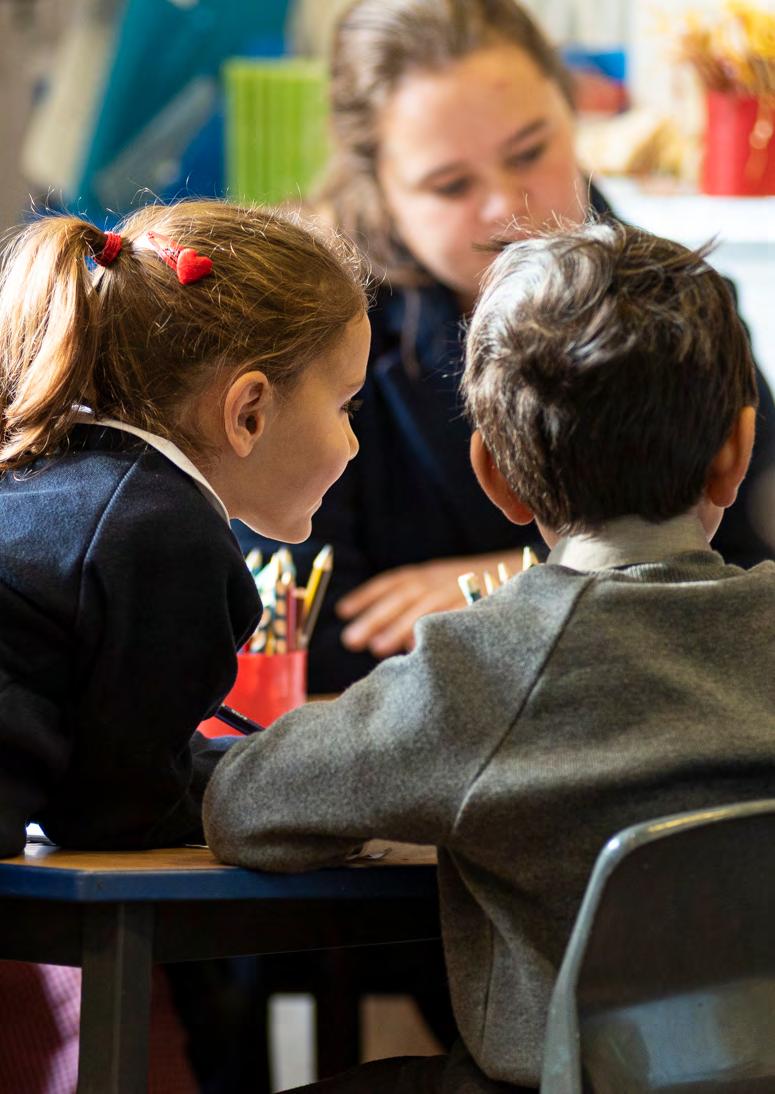


History is how we have learnt to think about ourselves. It’s not as though the Greeks and Romans are static entities out there to be discovered and translated. We make them speak, we talk to them, and they inform what we say.
- Mary Beard



The Learning Orchard is knowledge rich, teaching well-sequenced geography and history with breadth and depth.
Here, these frequently overshadowed subjects are valued and taught to be remembered. We immerse children in real-world contexts and ambitious, multi-layered topics, and underpin teaching with oracy and philosophy. Children understand landscapes, societies, and their place within them. They learn from the past in order to build the future.
Our Geography teaching establishes the foundations of physical, environmental and human geography. Children learn to understand maps, compass points and time zones; grapple with economic and political globalisation; and traverse rivers, mountains, climate, flora and fauna. History lessons span from ancient civilisations to the modern day. We examine political movements and power; study the Trans Atlantic Slave Trade; and teach detailed British history covering war, monarchy and the industrial revolution.


By incorporating such an enriching knowledge base in our curriculum, we enhance children’s critical thinking skills; develop their long-term memory; and expand their vocabulary. As a result, they are not only able to better recall and articulate important facts, but think and converse deeply and inquisitively. After all, a fascination with our world and its history makes for more fascinating people.
• Knowledge organiser summaries provide stimulus at the beginning of every topic, capturing important vocabulary, dates and key facts.








• We use prompts, quizzes, and discussions to build upon children’s prior learning, and make key words and phrases memorable by rehearsing essential vocabulary and delving into etymology.
• Overall, we teach with a ‘tell it like a story’ approach, delivering new topics via interactive and engaging lessons that leave children eager to know more.


Reasoning is the ability to understand and solve problems; to follow sequences, deduce meaning and decipher codes based on the information before us. It is a skill evaluated in 11+ examinations and valuable throughout a child’s academic career. Yet despite being a frequently challenging aspect of many 11+ papers, Reasoning is rarely taught formally in schools.
In The Learning Orchard, however, it is a dedicated subject. We deconstruct Reasoning into focused units that immerse Key Stage 2 (KS2) children from Form 3 onwards in a wide range of concepts, puzzles, questions and contexts. By teaching Verbal Reasoning, we enhance linguistic ability and enable children to analyse and interpret written information with ease. While through Non-Verbal Reasoning practice, we help to sharpen their spatial awareness and problem-solving skills.
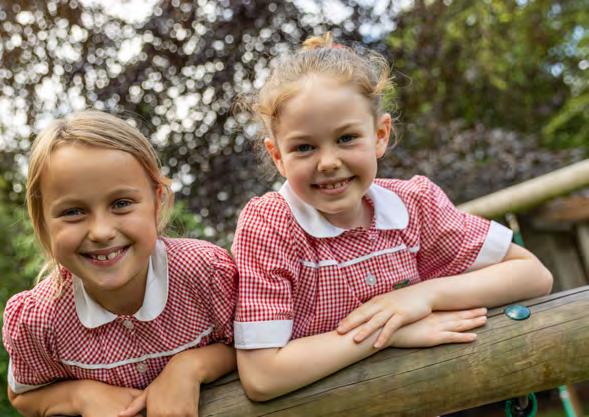
Altogether, children become well-rounded, perceptive and confident problem-solvers. They will be able to see things from multiple perspectives; think critically and creatively; and feel thoroughly prepared for their exams.
Verbal Reasoning topics encompass vocabulary development, word building and sentence work; coding and sequences; deductions and sentence and statement, letter and number logic; and algebra, calculations and equations. Non-Verbal Reasoning work includes shape recognition and association, coding and patterns and the manipulation of 2D and 3D shapes.
• We follow a multifaceted methodology using resources including puzzles, interactive activities, concrete manipulatives and structured problemsolving exercises.
• We provide opportunities for children to practise their reasoning using ATOM Learning, an engaging exam preparation platform.


• All children in KS2 complete an annual CAT4 test, which helps us understand how they learn and assess their academic potential.



while KS2 children have the opportunity to experiment with a number of instruments and disciplines. Form 3 practise African djembe drumming; Form 4 experiment with body percussion; Form 5 learn ukulele and songwriting; and Form 6 compose scores
Multiple mediums in Art
Annual school art exhibition

Christmas drama production

for film scenes. Throughout KS2, we also give children the opportunity to try a range of brass, string and woodwind instruments, which they might pursue further via extracurricular lessons.





Workshops with the Young Shakespeare Company
Range of musical intruments
Dalcroze eurhythmics
I found I could say things with colour and shapes that I couldn’t say any other way – things I had no words for.
- Georgia O’Keefe



We underpin our entire curriculum with oracy and philosophy.
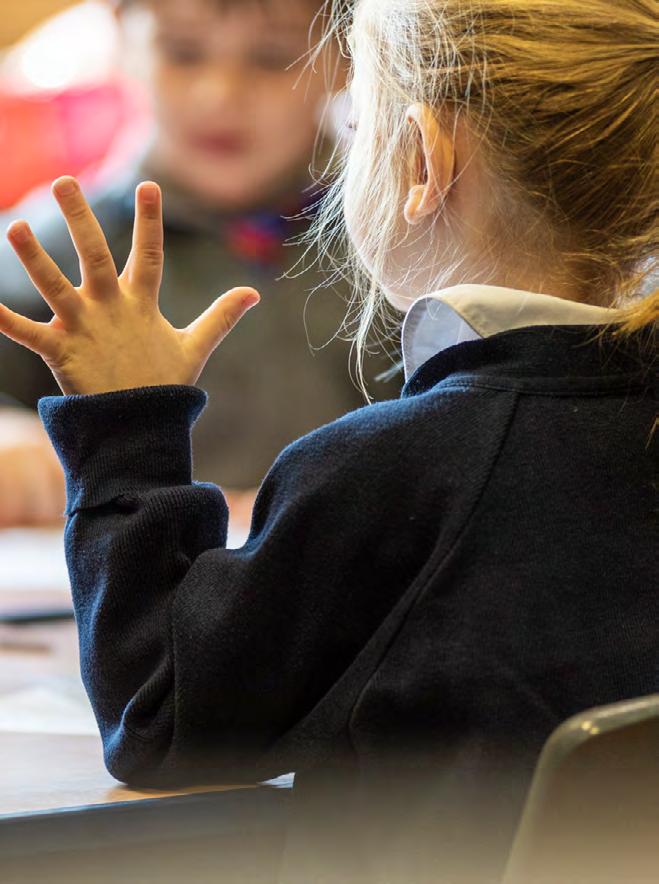

The limits of my language are the limits of my mind. All I know is what I have words for.
- Ludwig Wittgenstein, Austrian Philosopher

Philosophy and oracy are integral disciplines at Orchard House School. They are woven throughout the curriculum, enriching every tree in The Learning Orchard. We encourage a thoughtful, talk-rich culture within every classroom and incorporate both disciplines into lesson planning. In this environment, children grow into well rounded and articulate young people able to share opinions with spirit, listen deeply, debate respectfully and interview well.
Using resources from Philosophy 4 Children and Sapere, we hold weekly combined lessons in Philosophy and Oracy. Lessons comprise games, challenges and opportunities to think and talk at length. In ‘Thinkers’ Games’ children are led to think, commit, justify and reflect. They grapple with ‘Y Questions’, which have two diverging, but equally appealing, answers. Children are also able to apply their learning to ‘Philosophy In Role’ activities, in which they respond to carefully selected stimuli including video clips, news stories, pictures and objects.
To become confident and articulate conversationalists, children need supportive spaces in which to stand up and speak. We create as many as possible at Orchard House School. We give children the opportunity to participate in English Speaking Union workshops to develop their debating and public speaking skills; open the stage for annual class assemblies
where the children perform in front of an audience; and encourage rich, extended talk and presentations throughout the curriculum.
Philosophy and Oracy extends beyond the school walls and into the home with our weekly Sticky Questions. Children of every age receive a sticker featuring one of over 300 creative, ethical and philosophical questions, ranging from ‘When does enhancing a photo become a lie?’ to ‘Is there anything that cannot be measured?’. The homework is to use the sticker as a conversational prompt and bring their thoughts back to school, encouraging informal philosophical contemplation and discussion.
Practising these disciplines throughout their schooling enables children to:
• Speak and write clearly, with correct grammar and authority
• Embrace uncertainty and ‘flounder intelligently’ to find solutions to novel problems
• Make sense of their thoughts, reflecting deeply and finding links
• Deepen their understanding of topics as they articulate, evaluate and challenge ideas
• Reinforce their long-term memory and learning across the curriculum
The Learning Orchard is our bespoke curriculum, comprising subjects and topics devised by our specialised teachers to suit our ambitious children and school. It is not, however, an exhaustive look at the entire Orchard House School timetable.
While they have not been reimagined as part of our unique curriculum, Sport, Computing and French continue to be taught with absolute excellence at our school. These valued subjects complement the core curriculum and help us to cultivate the qualities for which we strive in every child. Outside of the classroom we also remain passionate about extracurricular activities, performance, events and trips, all of which are essential to the learning experience at our school.
There is much to be proud of in the Orchard House School Sports department. It is both highly specialised and accomplished, with exceptional facilities for sports ranging from judo to football. We teach weekly PE and swimming lessons; arrange regular fixtures with local prep schools; and feature prominently in inter-school competitions
held by IAPS and Dukes. In partnership with the Royal Ballet School we also offer the Primary Steps programme, a fun and positive introduction to ballet.
Our ambitious and forward-thinking approach to Computing prepares children for the future. Equipped with the cutting-edge tools and facilities in our STEAM centre, children experiment with micro bits, green screens, 3D printers and blue bots. We teach the fundamentals of coding from an early age, beginning with block code and progressing to advanced programming languages in UKS2. Ultimately, children learn everything they need to develop simple video games and websites.
Teaching a second language from nursery onward sows the seeds of global citizenship and fosters a deeper appreciation of different cultures. Our weekly French lessons, which comprise an award-winning programme delivered by skilled linguists, cover essential vocabulary, grammar and pronunciation. They include songs, games and stories that make learning fun, memorable and accessible to all ages and abilities. To enhance engagement, we link lessons with learning from The Learning Orchard curriculum.

